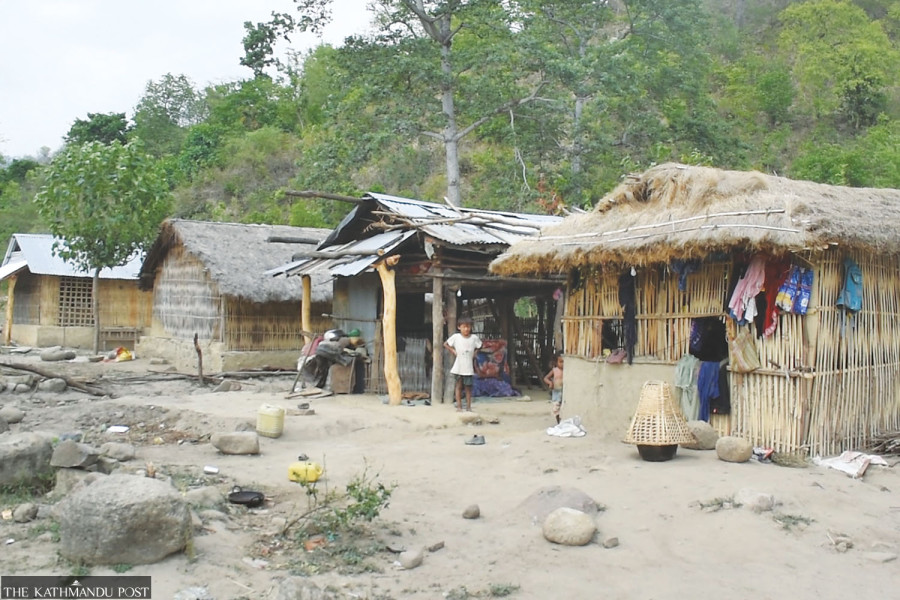National
Residents of Khoriya settlement in Siraha are deprived of basic facilities and services
The village does not have roads, water supply and electricity. Villagers say they feel ignored by authorities.
Binay Aazad
Khoriya settlement in ward 7 of Mirchaiya Municipality is around five kilometres south from the East-West Highway. The settlement lies in the land of Hattimunda Community Forest. There are a total 24 households—mostly Dalit and some indigenous communities—with a total population of around 120 people.
After crossing the Bataha stream, it takes an hour-long walk to reach the settlement through the forest, which is the only way to get there as there is no motorable road connecting the settlement.
Bhim Pakhrin, a 41-year-old man from Khoriya, said that the 24 Dalit and indigenous families have been living in the settlement for the past 27 years. “Though our settlement is not far from the highway, the village does not have roads, water supply and electricity,” said Pakhrin.
“A cubit wide foot trail leads to the village. One cannot come out of the village when the Bataha stream is flooded during the rainy season. When someone falls ill and there is a flood in the stream, they are forced to suffer at home.”
According to Pakhrin, a woman of eight months pregnant was suffering from lower abdominal pain during the rainy season last year. She could not be taken to the health institution as the stream was swollen with rain water.
“She started bleeding later,” Pakhrin said. “Her husband managed to bring a doctor to their home only after the water lever receded. That time the doctor said if he was even half an hour later both the mother and the infant could have died.”
People in this settlement always risk their lives in the absence of a road and bridge over the Bataha stream.
Until last year, the residents of Khoriya were dependent on a natural well near the Bataha stream, which used to get very polluted during the rainy season. It took nearly 45 minutes to reach the well and return to the settlement. Currently, the villagers get water from a well which was dug in the settlement with the help of some donors.
According to the locals, despite their repeated requests to build a well in the settlement, they received nothing but disappointment from the municipal authorities.
If the donors had not helped them build the well, the locals would still be walking for a long time back and forth in the jungle to fetch water. However, water from both wells is not safe for drinking.
“The water in the well is always murky and polluted, and we are forced to drink it because there is no other option. Despite our hard efforts to protect the well, wild animals fell and died in the well and polluted the water,” said Phul Maya Biswakarma, a 58-year-old local resident of Khoriya. “I wonder why the local level and district level authorities do not help us solve our problems. They ignore this settlement of impoverished Dalit and indigenous communities.”
Since there is no electricity transmission line in the settlement, most of the families light up candles, oil lamps, and lanterns during the night. As the settlement is located on community forest land, the locals are always in fear of being displaced.
The locals receive threats and warnings to vacate the land from the forest committee, forest rangers, and other officials of the division forest office every other week. However, the locals don’t leave the settlement because they have nowhere else to go.
Most of the residents of Khoriya settlement are performing menial labour and selling firewood and livestock for their livelihood. “The forest officials have even threatened us that they will burn down our houses if we don’t leave the land,” said Biswakarma.
There are around 35 children of school-going age in the settlement, and only 15 of them go to school, which is in another village. Most of the school-going children, especially girls, drop out because the school is very far.
Manju Tamang, a grade 8 student from Khoriya, is studying at Babuji Ray Junai Thakur Secondary School, which is more than an hour’s walk away through the forest. “It is always scary to walk through the forest. We are always at risk of getting attacked by wild animals,” Tamang said. “Due to that, several of my friends have dropped out of school. It is also hard for us to do our homework after we get home late and there is no electricity here.”
Around 100 poor families—mainly the internally displaced families—from Sindhuli, Udayapur, Okhaldhunga and other hill districts came to the area and started living in the settlement when the Maoist insurgency began in 1996.
Khadga Bahadur Tamang, a 68-year-old man from the settlement, said they have been living in the area of the community forest since 1997.
“More than 100 families were living in the community forest at that time, but due to wild animal terror and fear of evacuation by the authorities concerned, several started migrating,” Khadga Bahadur said. “There are now only 24 families living in the Khoriya settlement who have nowhere to go.”
Sujit Kumar Jha, head of the Division Forest Office, Siraha, said that since the settlement is forest land, they are just trying to free it from encroachment.
“We are just following the rules, trying to vacate the land, and doing nothing wrong,” Jha said. “There are plenty of vacant lands outside the forest; the government can manage them there, and by doing so, the forest land will also be secure, and the locals of the Khoriya settlement will get a place to live.”
There are around 50 people who have voter identification cards. They complain that during every election, leaders visit them for votes and express their commitments to resolve their problems. “But they never return once the election is over,” said a local.
Ramdayal Thakur, ward chairman of Mirchaiya-7, said that the ward office tried to help the locals of Khoriya but to no avail due to noncooperation of the higher authorities.
“The ward itself cannot resolve the problems of the settlement. We know that the local people in Khoriya settlement are deprived of basic facilities and services. We requested the higher authorities to address the problems,” said Thakur.
“The municipal office, district authorities and the provincial government should either relocate the settlement or provide land and basic facilities to the locals.”




 18.12°C Kathmandu
18.12°C Kathmandu














